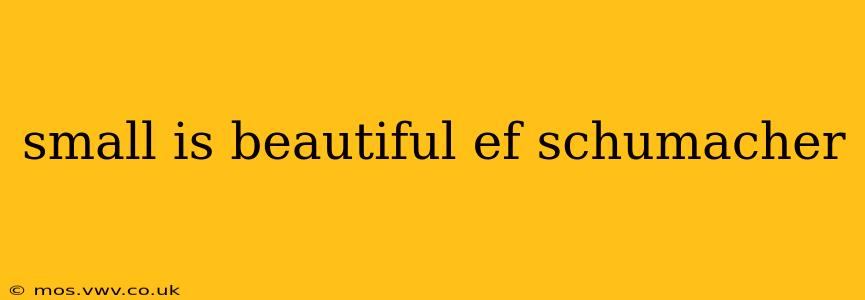E.F. Schumacher's Small Is Beautiful: Economics as if People Mattered, published in 1973, remains a surprisingly relevant and profoundly insightful critique of modern economic thinking. More than just a collection of essays, it's a philosophical manifesto advocating for a more humane and sustainable approach to economics, one that prioritizes human well-being and ecological balance over relentless growth. Schumacher's work challenges the prevailing dogma of endless expansion, urging us to reconsider our relationship with nature and the very definition of progress. This enduring classic continues to resonate today as we grapple with climate change, social inequality, and the limitations of a purely materialistic worldview.
What is the main argument of Small is Beautiful?
Schumacher's central argument is a forceful rejection of what he terms "giganticism"—the unchecked pursuit of large-scale industrialization and technological advancement without regard for its social and environmental consequences. He contends that this approach, while seemingly leading to increased productivity and wealth, ultimately undermines human well-being and ecological sustainability. He champions a more appropriate, human-scale technology, emphasizing decentralization, local self-sufficiency, and a deeper connection with the natural world. This isn't a rejection of technology altogether, but rather a call for a more mindful and selective application of it. He advocates for "intermediate technology"—technologies that are appropriate to the local context, readily understandable and manageable by the people who use them, and environmentally sound.
What are the key ideas in Small is Beautiful?
Several key ideas underpin Schumacher's philosophy:
-
Appropriate Technology: This concept is central to Schumacher's vision. Appropriate technology is neither overly simplistic nor excessively complex; it's designed to meet the specific needs of a community using readily available resources and skills. It fosters self-reliance and reduces dependence on external forces.
-
Buddhist Economics: Schumacher draws heavily on Buddhist philosophy to emphasize the importance of human purpose and spiritual fulfillment. He critiques materialistic economics for focusing solely on material wealth, arguing that true wealth encompasses well-being, community, and a harmonious relationship with nature.
-
Limits to Growth: Long before it became a mainstream concern, Schumacher recognized the inherent limitations of our planet's resources and the unsustainable nature of endless economic expansion. He stressed the importance of living within ecological limits.
-
Decentralization: Schumacher advocates for decentralized economic systems, believing that concentrated power leads to inefficiency, exploitation, and environmental damage. He suggests empowering local communities to manage their own resources and make decisions that best suit their needs.
What are the criticisms of Small is Beautiful?
While widely lauded, Small Is Beautiful has faced criticism. Some argue that Schumacher's vision is overly idealistic and impractical in a globalized world dominated by large corporations and complex supply chains. Critics also point to the potential for inefficiency and a lack of innovation in decentralized systems. Furthermore, the application of "appropriate technology" can be challenging in diverse contexts and may not always be the most effective solution. However, many of these criticisms overlook the book's underlying message: a call for a more thoughtful and humane approach to economic development that prioritizes people and the planet.
What is the relevance of Small is Beautiful today?
The relevance of Schumacher's work is undeniable in the face of current global challenges. Climate change, resource depletion, and social inequality highlight the limitations of an economic system focused solely on growth. Schumacher's emphasis on sustainability, local self-reliance, and mindful technology offers a powerful counter-narrative to the dominant paradigm. His ideas continue to inspire movements advocating for ecological stewardship, social justice, and a more humane and sustainable future. The principles outlined in Small Is Beautiful serve as a potent reminder that economic progress must be measured not just by material wealth, but by its impact on human well-being and the health of the planet.
How does Small is Beautiful relate to environmentalism?
Schumacher's work is deeply intertwined with environmentalism. He recognized the intrinsic connection between economic activity and environmental health, arguing that unchecked economic growth inevitably leads to environmental degradation. His advocacy for appropriate technology, decentralized systems, and a mindful approach to resource consumption directly addresses the need for ecological sustainability. His critique of the "throw-away" mentality, prevalent in mass consumerism, anticipates contemporary concerns about waste and pollution. In essence, Small Is Beautiful provides a foundational text for ecological economics, emphasizing the need to integrate environmental considerations into economic decision-making.
Is Small is Beautiful a good introduction to ecological economics?
While not explicitly an introductory text on ecological economics, Small Is Beautiful provides a powerful and accessible introduction to its core principles. Schumacher's clear and engaging writing style, combined with his insightful critiques of conventional economics, makes it an excellent starting point for anyone interested in exploring alternative economic models that prioritize sustainability and social justice. It lays the groundwork for understanding the limitations of traditional economics and the need for a more holistic approach that considers the interconnectedness of ecological and economic systems.
